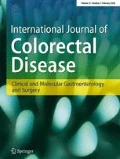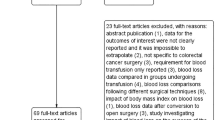Abstract
Purpose
This study aimed to assess the effect of intraoperative blood loss (IBL) on short- and long-term outcomes of colorectal cancer surgery for very elderly patients.
Methods
We acquired the data of consecutive patients aged 80 years or older who underwent elective radical surgery for stage I to III colorectal cancer between January 2003 and December 2007 in 41 institutions. The patients were divided into high and low IBL groups, and the differences in postoperative morbidity and survival between the two groups were primarily assessed. Eleven factors were treated as potential confounders in multivariate analyses.
Results
A total of 1554 patients were eligible for this study, with an age range of 80–103 years. Median IBL was 71 ml (interquartile range, 25 to 200 ml), and 412 patients had IBL ≥200 ml. Morbidity was 46 % among patients with IBL ≥200 ml, compared with 30 % among those with IBL <200 ml (p < 0.001). Patients with IBL ≥200 ml had worse overall survival rates and recurrence-free survival rates at 1, 3, and 5 years than those with IBL <200 ml. In multivariate analyses, IBL ≥200 ml was identified as an independent risk factor for postoperative adverse events (odds ratio (OR) 1.41, 95 % confidence interval (CI) 1.08 to 1.86), overall survival (hazard ratio (HR) 1.34, 95 % CI 1.04 to 1.72), and recurrence-free survival (HR 1.29, 95 % CI 1.03 to 1.62).
Conclusion
The degree of IBL is significantly associated with postoperative morbidity and survival in very elderly colorectal cancer patients.

Similar content being viewed by others
References
Matsuda T, Marugame T, Kamo K et al (2008) Japan cancer surveillance research group. Cancer incidence and incidence rates in Japan in 2002: based on data from 11 population-based cancer registries. Jpn J Clin Oncol 38:641–648
Kaufman DW, Kelly JP, Rosenberg L et al (2002) Recent patterns of medication use in the ambulatory adult population of the United States: the Slone survey. JAMA 287:337–344
Fihn SD, McDonell M, Martin D et al (1993) Risk factors for complications of chronic anticoagulation. A multicenter study. Warfarin optimized outpatient follow-up study group. Ann Intern Med 118:511–520
Colorectal cancer collaborative group (2000) Surgery for colorectal cancer in elderly patients: a systematic review. Lancet 356:968–974
Morner ME, Gunnarsson U, Jestin P et al (2012) The importance of blood loss during colon cancer surgery for long-term survival: an epidemiological study based on a population based register. Ann Surg 255:1126–1128
Egenvall M, Morner M, Pahlman L et al (2014) Degree of blood loss during surgery for rectal cancer: a population-based epidemiologic study of surgical complications and survival. Color Dis 16:696–702
Hinoi T, Kawaguchi Y, Hattori M et al (2015) Laparoscopic versus open surgery for colorectal cancer in elderly patients: a multicenter matched case–control study. Ann Surg Oncol 22:2040–2050
Kumar R, Jain K, Beeke C et al (2013) A population-based study of metastatic colorectal cancer in individuals aged C80 years. Cancer 119:722–728
Khattak MA, Townsend AR, Beeke C et al (2012) Impact of age on choice of chemotherapy and outcome in advanced colorectal cancer. Eur J Cancer 48:1293–1298
Turrentine FE, Wang H, Simpson VB et al (2006) Surgical risk factors, morbidity, and mortality in elderly patients. J Am Coll Surg 203:865–877
Jeong DH, Hur H, Min BS et al (2013) Safety and feasibility of a laparoscopic colorectal cancer resection in elderly patients. Ann Coloproctol 29:22–27
Pawa N, Cathcart PL, Arulampalam TH et al (2012) Enhanced recovery program following colorectal resection in the elderly patient. World J Surg 36:415–423
Naef M, Kasemodel GK, Mouton WG et al (2010) Outcome of colorectal cancer surgery in the early fast-track era with special regard to elderly patients. Int Surg 95:153–159
Nascimbeni R, Di Fabio F, Di Betta E et al (2009) The changing impact of age on colorectal cancer surgery. A trend analysis. Color Dis 11:13–18
Scharfenberg M, Raue W, Junghans T et al (2007) “Fast-track” rehabilitation after colonic surgery in elderly patients—is it feasible? Int J Color Dis 22:1469–1474
Angele MK, Faist E (2002) Clinical review: immunodepression in the surgical patient and increased susceptibility to infection. Crit Care 6:298–305
Hoynck van Papendrecht MA, Busch OR, Jeekel J et al (1991) The influence of blood loss on tumour growth: effect and mechanism in an experimental model. Neth J Surg 43:85–88
Yago H, Yoshii H, Naiki M et al (1992) Stress and murine NK cell function: the role of blood loss. J Clin Lab Immunol 37:123–132
Tartter PI, Steinberg B, Barron DM et al (1987) The prognostic significance of natural killer cytotoxicity in patients with colorectal cancer. Arch Surg 122:1264–1268
van Osch MJ, Jansen PA, Vingerhoets RW et al (2005) Association between supine cerebral perfusion and symptomatic orthostatic hypotension. Neuroimage 27:789–794
Cata JP, Wang H, Gottumukkala V et al (2013) Inflammatory response, immunosuppression, and cancer recurrence after perioperative blood transfusions. Br J Anaesth 110:690–701
Grailey K, Markar SR, Karthikesalingam A et al (2013) Laparoscopic versus open colorectal resection in the elderly population. Surg Endosc 27:19–30
Fujii S, Ishibe A, Ota M et al (2014) Short-term results of a randomized study between laparoscopic and open surgery in elderly colorectal cancer patients. Surg Endosc 28:466–476
Chautard J, Alves A, Zalinski S et al (2008) Laparoscopic colorectal surgery in elderly patients: a matched case–control study in 178 patients. J Am Coll Surg 206:255–260
Delgado S, Lacy AM, Garcia Valdecasas JC et al (2000) Could age be an indication for laparoscopic colectomy in colorectal cancer? Surg Endosc 14:22–26
Person B, Cera SM, Sands DR et al (2008) Do elderly patients benefit from laparoscopic colorectal surgery? Surg Endosc 22:401–405
Sklow B, Read T, Birnbaum E et al (2003) Age and type of procedure influence the choice of patients for laparoscopic colectomy. Surg Endosc 17:923–929
Tomimaru Y, Ide Y, Murata K (2011) Outcome of laparoscopic surgery for colon cancer in elderly patients. Asian J Endosc Surg 4:1–6
Leichtle SW, Mouawad NJ, Lampman R et al (2011) Does preoperative anemia adversely affect colon and rectal surgery outcomes? J Am Coll Surg 212:187–194
Jagoditsch M, Pozgainer P, Klingler A et al (2006) Impact of blood transfusions on recurrence and survival after rectal cancer surgery. Dis Colon Rectum 49:1116–1130
Bernard AC, Davenport DL, Chang PK et al (2009) Intraoperative transfusion of 1 U to 2 U packed red blood cells is associated with increased 30-day mortality, surgical-site infection, pneumonia, and sepsis in general surgery patients. J Am Coll Surg 208(931–7):937
Amato A, Pescatori M (2006) Perioperative blood transfusions for the recurrence of colorectal cancer. Cochrane Database Syst Rev 1:CD005033
Acknowledgments
This study was supported in part by the Japanese Society for Cancer of the Colon and Rectum. The authors thank all members of the institutions belonging to the Japan Society of Laparoscopic Colorectal Surgery that participated in this multicenter study: Eiji Kanehira, Kunihisa Shiozawa (Ageo Central General Hospital); Hiroyuki Bando, Daisuke Yamamoto (Ishikawa Prefectural Central Hospital); Seigo Kitano, Masafumi Inomata, Tomonori Akagi (Oita University); Junji Okuda, Keitaro Tanaka (Osaka Medical College); Kosei Hirakawa, Kiyoshi Maeda (Osaka City University); Akiyoshi Kanazawa (Osaka Red Cross Hospital); Junichi Hasegawa, Junichi Nishimura (Osaka Rosai Hospital); Ichio Suzuka (Kagawa Prefectural Central Hospital); Shintaro Akamoto (Kagawa University); Yosuke Fukunaga, Hiroya Kuroyanagi (Cancer Institute Ariake Hospital); Masaki Naito (Kitasato University); Takashi Ueki (Kyushu University); Takashi Yamaguchi (Kyoto Medical Center); Yukihito Kokuba (Kyoto Prefectural University); Hirotoshi Hasegawa (Keio University School of Medicine); Norio Saito, Masaaki Ito (National Cancer Hospital East); Jou Tashiro (Saitama Medical University); Shigeki Yamaguchi (Saitama Medical University International Medical Center); Toshimasa Yatsuoka (Saitama Cancer Center); Tomohisa Furuhata, Kenji Okita (Sapporo Medical University); Yoshiro Kubo (Shikoku Cancer Center); Shuji Saito, Yosuke Kinugasa (Shizuoka Cancer Center); Hisanaga Horie (Jichi Medical University); Fumio Konishi (Saitama medical Center Jichi Medical University); Michitoshi Goto (Juntendo University); Junichi Tanaka, Shungo Endo (Showa University Northern Yokohama Hospital); Kohei Murata (Suita Municipal Hospital); Nobuyoshi Miyajima, Tadashi Suda, Tsukasa Shimamura (St. Marianna University); Yasuo Kawaguchi (Tuchiya General Hospital); Kenichi Sugihara (Tokyo Medical and Dental University Graduate School); Yoshihisa Saida, Toshiyuki Enomoto (Toho University Ohashi Medical Center); Takeshi Naito (Tohoku University); Yasuhiro Munakata, Souichi Tagami (Nagano Municipal Hospital); Satoshi Maruyama (Niigata Cancer Center Hospital); Takao Ichihara (Department of Surgery, Nishinomiya Municipal Central Hospital); Seiichiro Yamamoto (Hiratsuka City Hospital); Masazumi Okajima (Hiroshima City Hospital); Hitoshi Idani (Fukuyama Municipal Hospital); Yasuhiro Miyake (Minoh City Hospital); Shoichi Hazama (Yamaguchi University); and Kazuteru Watanabe (Yokohama City University Medical Center).
Author information
Authors and Affiliations
Consortia
Corresponding author
Rights and permissions
About this article
Cite this article
Okamura, R., Hida, K., Hasegawa, S. et al. Impact of intraoperative blood loss on morbidity and survival after radical surgery for colorectal cancer patients aged 80 years or older. Int J Colorectal Dis 31, 327–334 (2016). https://doi.org/10.1007/s00384-015-2405-5
Accepted:
Published:
Issue Date:
DOI: https://doi.org/10.1007/s00384-015-2405-5




